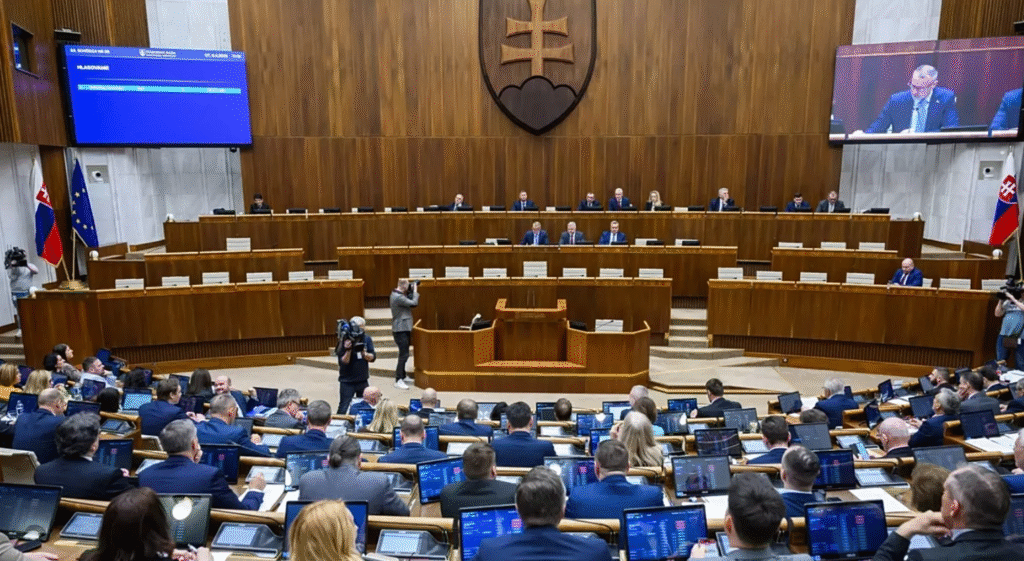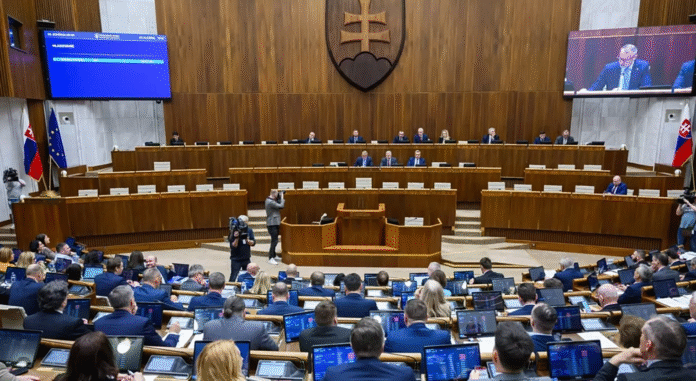Slovakia Law Recognising Two Sexes Passed in Parliament
In a controversial decision, the Slovak parliament has approved a Slovakia law recognising two sexes as part of a constitutional amendment. The legislation explicitly defines only male and female as legally valid sexes and restricts adoption rights to married heterosexual couples. Surrogacy is also prohibited under the new law.
The ruling has ignited debates both inside Slovakia and across Europe, with human rights organisations warning that it undermines LGBTQ rights and brings the country closer in alignment with governments in Hungary and Russia.

How the Slovakia Law Recognising Two Sexes Passed
The vote was far from guaranteed. Prime Minister Robert Fico’s coalition, made up of populist, leftist, and nationalist parties, controls only 78 out of 150 seats in the National Council. For the constitutional amendment to pass, 90 votes were required.
In a surprising turn of events, 12 opposition MPs sided with the government. The Christian Democrats were expected to support the measure, but several MPs from Igor Matovic’s movement also joined at the last minute, tipping the scales.
Matovic branded these members as “traitors,” while the government hailed the outcome as a victory for “traditional values.”
Prime Minister Fico Celebrates the Vote
Prime Minister Robert Fico praised the Slovakia law recognising two sexes, describing it as a “great dam against progressivism.” He claimed liberal ideology was “spreading like cancer” and insisted the law was necessary to protect the cultural and ethical foundations of Slovak society.
Fico even joked that his party would celebrate the vote with a shot of liquor, underlining how significant the ruling coalition views this decision.
Critics Say the Law Hurts LGBTQ Rights
Not everyone sees the constitutional amendment as a victory. Amnesty International and other rights groups argue that enshrining recognition of only two sexes will make life significantly harder for LGBTQ citizens.
Legal experts within Slovakia have also warned that such amendments place the country on a collision course with the European Union, potentially leading to sanctions or prolonged legal battles over the primacy of Slovak constitutional law versus EU law.
Analysts Call It a Political Distraction
Some Slovak commentators suggest that the Slovakia law recognising two sexes is less about gender identity and more about politics.
Beata Balagova, editor-in-chief of the Slovak daily SME, argued that Prime Minister Fico is using cultural issues to divert attention from deeper economic problems and unpopular austerity measures. She suggested that Fico’s real motive is to weaken the opposition rather than genuinely address questions of gender or adoption.
Opposition Reaction to the Vote
Progressive Slovakia, currently leading in opinion polls, reacted sharply to the surprise support from Matovic’s MPs. Party leaders declared that any future cooperation with Matovic’s movement was now impossible.
Most opposition lawmakers avoided the parliamentary session altogether, refusing to lend legitimacy to what they called a “constitutional betrayal.”
President Pellegrini’s Approval
Despite the fierce criticism, President Peter Pellegrini confirmed he would sign the Slovakia law recognising two sexes into effect.
He stated:
“At a time of enormous division within Slovak society, a constitutional majority is an important signal that there is agreement on a specific issue across the political spectrum, and it must be respected.”
His remarks highlighted the deep divide between those who view the law as protecting national sovereignty and those who see it as undermining human rights.
Impact on Slovakia’s Relationship with the EU
The amendment carries serious implications for Slovakia’s relationship with the European Union. Legal scholars argue that placing Slovak constitutional authority above EU law directly challenges European integration.
Given that Hungary has already faced multiple sanctions and infringement procedures for similar legislation, analysts believe Slovakia could soon find itself under similar scrutiny.

Slovakia’s Ruling Party Faces Expulsion
The political fallout is not limited to domestic debates. Robert Fico’s Smer-Social Democracy party is facing expulsion from the Party of European Socialists (PES).
Smer was suspended in 2023 for forming a coalition with the far-right Slovak National Party. Since then, Fico has further alienated European allies by meeting with Russian President Vladimir Putin four times in less than a year.
The Slovakia law recognising two sexes may accelerate the party’s formal expulsion at the upcoming PES conference.
Traditional Values vs. Progressive Movements
For supporters, the new law represents a victory for traditional values and cultural sovereignty. For opponents, it marks a step backward in human rights, aligning Slovakia with illiberal states that undermine democratic principles.
This clash mirrors broader trends across Europe, where debates over national identity, sovereignty, and social progress continue to divide nations and political movements.
What Comes Next for Slovakia?
The adoption of the Slovakia law recognising two sexes is only the beginning of what promises to be a turbulent chapter in Slovak politics. Legal challenges from EU bodies are likely. Domestic protests may also grow as rights groups mobilize against what they call discriminatory legislation.
At the same time, Fico’s government will likely continue using cultural debates to distract from economic challenges, hoping to consolidate power ahead of upcoming elections.
Conclusion
The passage of the Slovakia law recognising two sexes has sent shockwaves across Europe, drawing praise from conservatives and condemnation from progressives. As Slovakia moves closer to Hungary and Russia on cultural policy, it risks isolating itself within the European Union.
The law is not only about gender, it’s about sovereignty, identity, and the future direction of Slovak democracy.

